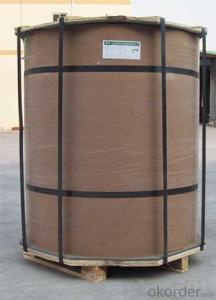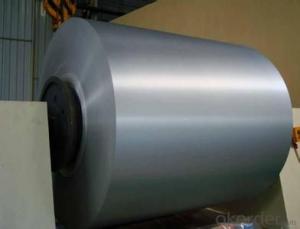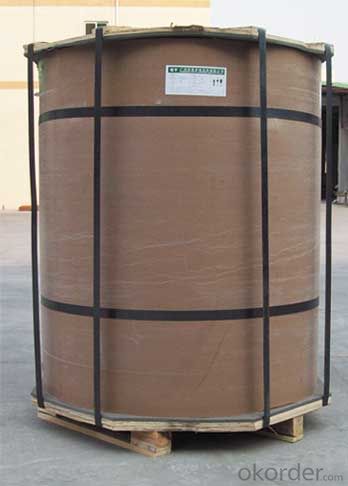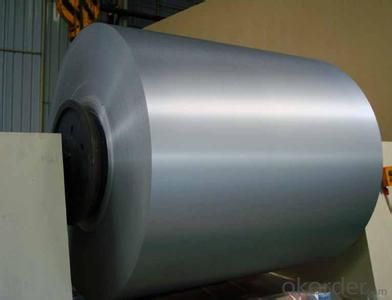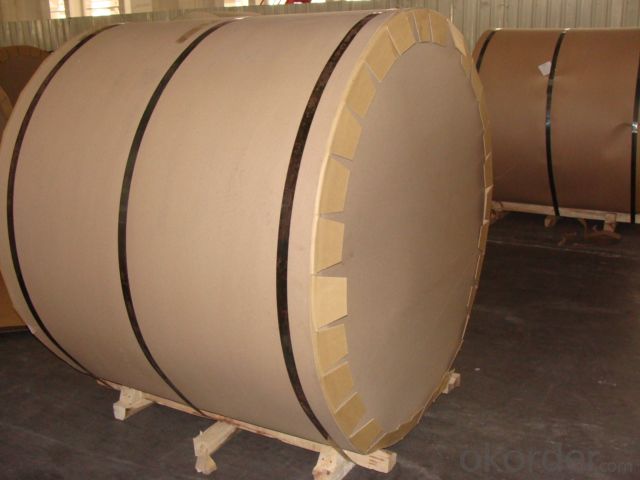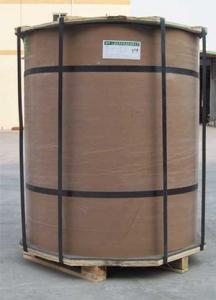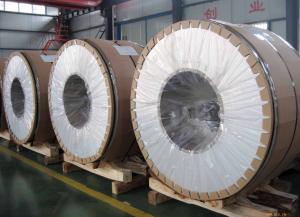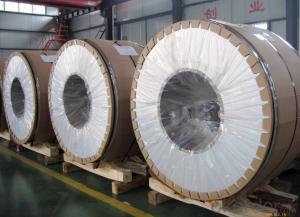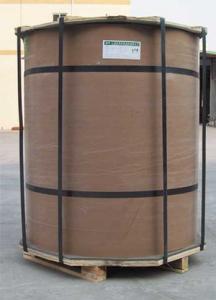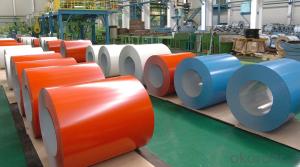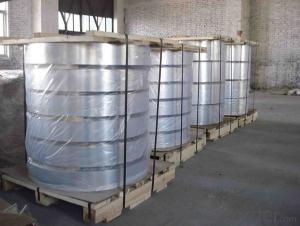032 Aluminum Coil - Mill-Finished Aluminum Coils 5xxx
- Loading Port:
- China Main Port
- Payment Terms:
- TT OR LC
- Min Order Qty:
- -
- Supply Capability:
- -
OKorder Service Pledge
OKorder Financial Service
You Might Also Like
Specifications
Aluminum Coil
1.Manfacture
2.Woodenbox package
3.Material is from big aluminum factory
High Quality and Factory Price Aluminum Coil
Specifications
Grade
| 1000 Series: 1050 1060 1070 1100 1200 1235 etc. 3000 Series: 3003 3004 3005 3104 3105 3A21 etc. 5000 Series: 5005 5052 5083 5086 5154 5182 5251 5754 etc. 6000 Series: 6061 6063 6082 6A02 etc. 8000 Series: 8006 8011 8079 etc. |
Thickness | 0.05~10mm |
Width | <1600mm |
Color | Metallic, Solid, RAL or by customer requirements |
Coating paint: | PVDF(Polyvinylidene Fluoride), PE(Polyester ) |
Coating thickness | as per customer’s request |
Gloss | 10-90%(EN ISO-2813:1994) |
Total coating thick | Polyester18~27micron(EN ISO-2360:1995) PVDF27 ~35micron(EN ISO-2360:1995) |
Coating hardness | 2H |
Protective film | PVC film, Colorless transparent or White-black |
Adhesion | 5B (EN ISO-2409:1994) |
Impact resistance | No cracking and peeling (A.S.T.M D2794-1993) |
Flexibility (T-bend) | 0T- 2T |
Temper | H16, H18, H24, H26, H26 |
Certification | ISO9001:2000, CE, SGS |
Coil's standard diameter | 1100mm |
Inner Diameter | 405mm/505mm |
Coil's standard weight | 2000kgs |
Payment | L/C ,T/T |
- Q: What are the uses of aluminum coils?
- Aluminum coils have various uses across multiple industries. They are commonly used in HVAC systems for cooling and heating purposes, as well as in refrigeration units. Additionally, aluminum coils are utilized in the construction industry for roofing, siding, and insulation purposes. They are also found in the automotive industry for radiators and condensers. Furthermore, aluminum coils are used in the manufacturing of electrical equipment, such as transformers and capacitors.
- Q: Can aluminum coils be used in the production of aluminum louvers?
- Yes, aluminum coils can be used in the production of aluminum louvers. Aluminum coils are typically used as a raw material in various manufacturing processes, including the production of aluminum louvers. They can be easily formed and shaped into the desired louver design, offering durability and corrosion resistance.
- Q: Can aluminum coils be used in the production of sporting goods?
- Yes, aluminum coils can be used in the production of sporting goods. Aluminum is lightweight, durable, and corrosion-resistant, making it suitable for various sports equipment like baseball bats, tennis rackets, golf clubs, and even bicycles. The use of aluminum coils allows manufacturers to create high-quality and high-performance sporting goods.
- Q: What does 1060 stand for in 1060 aluminum rolling?
- It means the aluminum content should be above 99.6%.
- Q: Can aluminum coils be utilized as an insulating material?
- <p>Aluminum coils are not typically used for insulation. They are good conductors of heat and electricity, which makes them unsuitable for insulation purposes. Insulation materials should be poor conductors to prevent the flow of heat or electricity. Aluminum coils are more commonly used in applications where conductivity is desired, such as in electrical wiring or heat exchangers. For insulation, materials like fiberglass, mineral wool, or plastic foams are used because they resist heat flow effectively.</p>
- Q: What is the bending radius for aluminum coils?
- The bending radius for aluminum coils can vary depending on the thickness and alloy of the aluminum. However, as a general guideline, the minimum bending radius for aluminum coils is typically around 1.5 times the thickness of the coil.
- Q: What are the different types of surface defect classifications for aluminum coils?
- There are several types of surface defect classifications for aluminum coils. These classifications are used to categorize and identify various imperfections that can occur on the surface of aluminum coils during the manufacturing process. Some common types of surface defects include: 1. Scratches: These are linear marks or grooves on the surface of the aluminum coil. Scratches can vary in depth and length and are typically caused by mechanical friction or handling during production or transportation. 2. Streaks: Streaks are discolorations or lines that appear on the surface of the coil. They are often caused by uneven coating or impurities in the aluminum material. 3. Dents: Dents are depressions or distortions on the surface of the coil. They can be caused by mishandling, impact, or improper storage of the coils. 4. Pitting: Pitting refers to the presence of small, localized holes or craters on the coil surface. It is often caused by the corrosion of the aluminum, exposure to aggressive environments, or improper surface treatment. 5. Surface contamination: This classification includes any foreign substances or contaminants that are present on the surface of the aluminum coil. Examples of surface contaminants can include oil, dirt, dust, or residues from the manufacturing process. 6. Oxide films: Oxide films are thin layers of aluminum oxide that can form on the surface of the coil. These films can vary in thickness and appearance and are often a result of exposure to air or moisture. It is important to classify and identify these surface defects accurately as they can affect the quality and performance of the aluminum coils. Manufacturers and customers use these classifications to determine the acceptability of the coils and make decisions regarding their usability and potential treatment or repair.
- Q: How are aluminum coils used in the production of heat sinks?
- Aluminum coils play a vital role in the production of heat sinks due to their excellent thermal conductivity and malleability. Heat sinks are designed to dissipate the excess heat generated by electronic components such as processors, integrated circuits, and power transistors. By utilizing aluminum coils in the manufacturing process of heat sinks, several key advantages are realized. Firstly, aluminum coils possess high thermal conductivity, which allows for efficient transfer of heat from the electronic component to the heat sink. This is crucial for maintaining the optimal operating temperature of the electronic device, as excess heat can cause performance degradation and even permanent damage. The high thermal conductivity of aluminum ensures that the heat is rapidly dissipated away from the electronic component, preventing overheating. Secondly, aluminum coils are highly malleable, making them easy to shape and mold into various designs required for heat sinks. Heat sinks are available in different sizes and shapes, with the most common being finned heat sinks. The fins on the heat sink increase the surface area, allowing for greater heat dissipation. Aluminum coils can be easily formed into these fin shapes, enabling the heat sink to effectively release heat into the surrounding environment. Additionally, aluminum coils are lightweight and corrosion-resistant, making them ideal for use in heat sinks. The lightweight nature of aluminum ensures that the heat sink does not add significant weight to the electronic device, which is especially important in applications where weight restrictions are crucial, such as aerospace or portable electronics. Moreover, the corrosion-resistant properties of aluminum ensure the longevity and durability of the heat sink, even in harsh environments. In conclusion, aluminum coils are essential components in the production of heat sinks due to their high thermal conductivity, malleability, lightweight, and corrosion-resistant properties. By incorporating aluminum coils into the manufacturing process of heat sinks, efficient heat dissipation and improved performance of electronic components can be achieved, ultimately prolonging the lifespan of electronic devices.
- Q: Aluminum coil thickness measurement, real-time measurement of aluminum coil thickness value, you can use displacement sensor?
- You should use the eddy current displacement sensor KD2306 if the object is aluminum,
- Q: What is the typical modulus of elasticity for aluminum coils?
- The typical modulus of elasticity for aluminum coils is around 70 GPa (gigapascals) or 10 million psi (pounds per square inch). Modulus of elasticity is a measure of a material's stiffness or ability to resist deformation when subjected to an applied force. Aluminum is known for its high strength-to-weight ratio and excellent elasticity, making it a popular choice in various industries, including automotive, aerospace, and construction. However, it is important to note that the modulus of elasticity can vary slightly depending on the specific alloy and temper of the aluminum coil.
Send your message to us
032 Aluminum Coil - Mill-Finished Aluminum Coils 5xxx
- Loading Port:
- China Main Port
- Payment Terms:
- TT OR LC
- Min Order Qty:
- -
- Supply Capability:
- -
OKorder Service Pledge
OKorder Financial Service
Similar products
Hot products
Hot Searches
Related keywords
